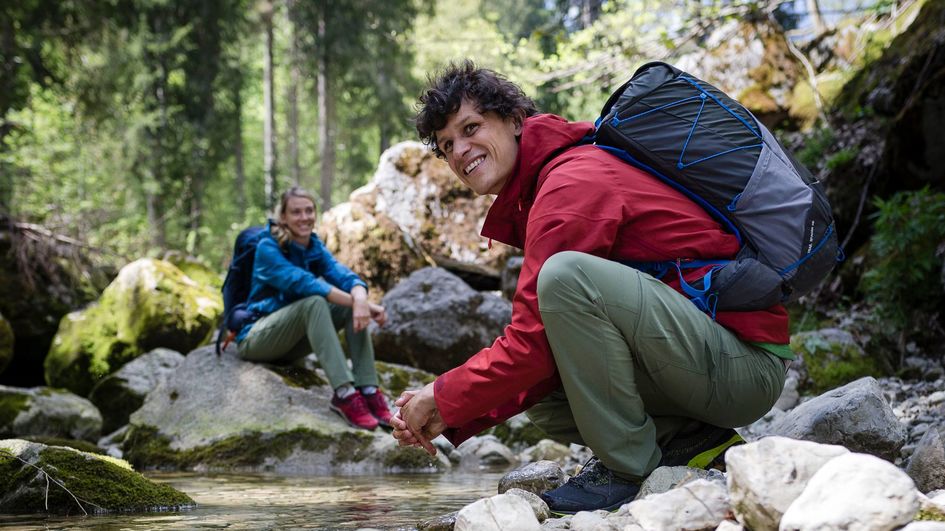
Going off the beaten track? Outdoor manufacturer VAUDE literally took this
idea twice: For its latest pair of trekking pants, the company uses a bio-based plastic fiber made from the oil of the castor plant – VESTAMID® Terra from Evonik.
“Textile manufacturing starts at the borehole,” says Benedikt Tröster from VAUDE. The trenchant phrase quite aptly reflects the reality of the modern textile industry: Synthetic fibers are ubiquitous in our clothing, whether they are called elastane, polyester or polyacrylic. And synthetic fibers almost always mean petroleum. This is now true for many types of underwear, sweaters and T-shirts, and it is even more true for that sub-sector of the industry to which VAUDE also belongs – the outdoor industry.
After all, the outdoor industry is particularly dependent on textiles fulfilling certain outstanding functions: They have to be elastic, not tear and, if possible, be water-repellent. Until now, the answer to this requirement profile was petroleum-based plastics. But the outdoor professional based at the foot of the Alps on the shores of Lake Constance in Southern Germany is already on its way into the post-fossil age. “We want to move away from petroleum,” says Tröster. “Toward renewable or recycled raw materials.” By winter 2021, half of VAUDE’s new collection should be made from such materials. Currently, it is already one-third.
Crude oil is finite. This is one of the key reasons why the specialty chemical company Evonik developed VESTAMID® Terra more than ten years ago – a plastic that can be produced entirely from renewable raw materials. In this case, from the oil of the castor bean plant. VESTAMID® Terra can be used in a variety of industries and applications, from plastic buckles to toothbrush bristles. In addition to that, however, it turned out that the polyamide has outstanding properties for textiles and can also be spun into filaments. “The result is a fiber that is very comfortable to wear, has good water management properties, can be dyed well at low temperatures, and also contributes to CO2 savings,” says Uwe Kannengießer, Director of Optics & Filaments in the High Performance Polymers Business Unit at Evonik.
Not only more sustainable, but also better performance

So, in its extensive search for suitable sustainable plastics, VAUDE landed at Evonik: “That’s unusual for our industry. We approached a chemical company directly, not a fabric manufacturer,” says René Bethmann, Innovation Manager Materials and Manufacturing at VAUDE.
The first test phase followed: could VESTAMID® Terra really be used as desired? “In the end, we found the plastic is not only more sustainable, but also has better properties compared to conventional polyamide fabric,” says Bethmann. Above all, the yarn’s lower moisture absorption is attractive for outdoor clothing, where a pair of pants should be ready for forays in damp grass or against short rain showers – and it is also an advantage if they dry faster after getting wet and after washing.
“VESTAMID® Terra is actually a completely new material in our industry,” Bethmann emphasizes, “Which is not at all common.” VAUDE consequently decided to design a pair of trekking pants from the material – the “Skarvan Biobased Pants” will be launched in spring 2021. This also fits in with the company’s own claim. “We want to be pioneers and leave the beaten track,” says Tröster. “However, the ecological footprint of our products should always be as small as possible. Climate neutrality is one of the very big corporate goals we have at VAUDE.”
However, bio-based raw materials always have to face the question if any other factors may contribute to destroying their sustainability balance – for example, because costly irrigation is required to grow the plant, or because the raw material could also be used as animal feed instead. “None of these issues apply to the castor bean plant,” says Bethmann. It doesn’t require fertilization or artificial irrigation, grows in dry areas that aren’t suitable for other types of agriculture in the first place – and is a popular food for caterpillars but inedible to humans and other mammals. The oil is made from the seeds, but unlike the seeds is completely non-toxic.
Expertise for high technology textiles
Both Evonik and VAUDE have noticed a significant increase recently in customer demand for environmentally friendly products. “The topic is current,” says Kannengießer from Evonik: “More and more people want sustainable consumption and not to be part of the throwaway society.” And consumers are willing to pay higher prices for this demand. Here, too, the outdoor industry has certain advantages over some other sectors of the textile industry: Since customers traditionally expect special properties from their sports and hiking clothing, correspondingly higher-priced high-tech products have always been part of the portfolio.
VAUDE has both the expertise and the contacts to spinning mills and textile manufacturers with access to the right machinery. Because this is also part of such an innovation: The spinning mills that produce the yarn from the granulate have to adjust their machines accordingly for the new material. “But it was also an opportunity for our partners to expand their product range and innovate,” says Bethmann. Accordingly, there was great interest in participating in the project. An additional advantage is that in this case the entire value chain is located in one region, so no material has to be transported back and forth across several continents between the individual process steps: Evonik produces VESTAMID® Terra in China, where the plant itself also grows. Spinning and textile production are located in Taiwan. “Taiwan has a great deal of expertise in technical textiles,” emphasizes Bethmann.

CO2 savings due to low temperatures
Here, too, VESTAMID® Terra turned out to be a particularly useful material because it can be easily processed by the spinning mill. VAUDE finally decided on a variant that consists of 62 percent castor oil and the remaining part of conventional raw material: “This new type of material has thus become part of a family that until now has mainly included petroleum-based polyamides for textile fibers, such as the classic polyamide 6 or 6.6,” says Bethmann. But at the same time, it offers higher abrasion resistance, better tear strength and more elastic elongation.
“We’re talking here about long-chain polyamides, such as those traditionally used for sports shirts, for example,” adds Evonik’s Kannengießer: “It’s actually very similar to polyamide 6.6.” On top of that, VESTAMID® Terra can be easily dyed even at low temperatures, which makes an additional contribution to the CO2 savings. This isan issue that Evonik is also paying close attention to – the company has set itself the goal of reducing CO2 emissions aspart of its “Strategy 2020+,” which includes both its own consumption and possible effects at customers. If you include the fact that additional carbon is stored by growing the castor plant, Evonik calculates that the CO2 footprint ofthe biopolyamide is only half that of the production of conventional plastic yarn.
If it were up to Bethmann, other competitors would be welcome to adopt VAUDE’s idea in the future: “After all, we’re only a medium-sized company, so it helps both awareness and production if other large companies also use VESTAMID® Terra.” VAUDE is self-confident enough to still stand out enough in this case – with its own brand, ideas and products. “We’ve proven how innovative we are and that we take pioneering spirit seriously by starting this project together with Evonik,” says Bethmann.
About Evonik
Evonik is one of the world leaders in specialty chemicals. The company is active in more than 100 countries around the world and generated sales of €13.1 billion and an operating profit (adjusted EBITDA) of €2.15 billion in 2019. Evonik goes far beyond chemistry to create innovative, profitable and sustainable solutions for customers. More than 32,000 employees work together for a common purpose: We want to improve life, day by day.
About Smart Materials
The Smart Materials division includes businesses with innovative materials that enable resource-saving solutions and replace conventional materials. They are the smart answer to the major challenges of our time: environment, energy efficiency, urbanization, mobility and health. The Smart Materials division generated sales of around €3.4 billion in 2019 with about 7,500 employees. It is part of Evonik Operations GmbH.
Source
EVONIK, press release, 2021-02.
Supplier
Share
Renewable Carbon News – Daily Newsletter
Subscribe to our daily email newsletter – the world's leading newsletter on renewable materials and chemicals









